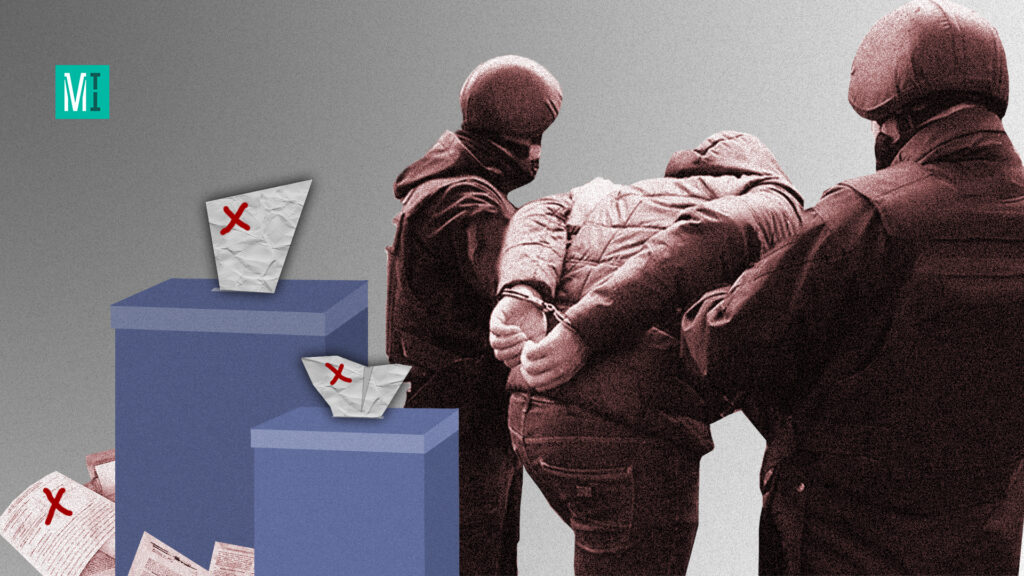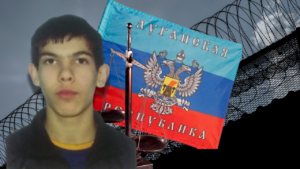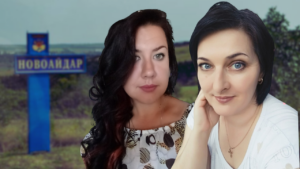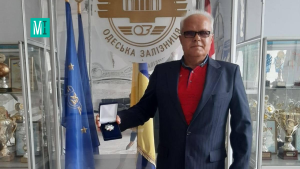Detention after the pseudo-referendum: in the Kherson region, people get kidnapped for refusing to vote

The Russian Federation held a so-called referendum on the accession to Russia in the occupied territories of Ukraine in late September. Voting went on for several days. They did not invite people to the polling stations, instead, they arranged a door-to-door tour. The so-called commission members and several armed men came to locals’ apartments. The commission paid particular attention to those who refused to vote, openly expressed pro-Ukrainian views, or took photos of commission members and military personnel. They detained, held in custody, or “deported” those.
The story of a couple from Kakhovka, “We will not sign, we are for Ukraine”
That is how a couple from Kakhovka, Kherson region, reacted to the commision arrival. On September 25, a woman – a representative of the occupiers’ precinct commission, accompanied by two armed men in Russian military uniforms – came to their home. The woman began to persuade thirty-year-old Oleh (name changed for security reasons) and his wife Natalia (name changed for security reasons) to vote pro-joining Russia and tried to impose a ballot. “The couple was indignant, ‘We will not sign, we are for Ukraine, this is our home.’ After that, a quarrel started,” the witnesses recall.
The district commission, consisting of two machine gunners and three civilians,
makes a door-to-door tour in Energodar, Zaporizhzhia region
The delegation left, and later, several Russian armored personnel carriers arrived at the yard.
“They took Natalia, Oleh ran away,” says the husband’s mother, Olha. “Later, my son called me on Telegram and said he would go to free Natalia. After that, he disappeared. Probably, they kept the couple in the premises of the Kakhovka local police department.”
Olha assures: the couple did not support the Russian authorities, the occupation of the city was a shock for them. They often complained about the Russians during phone conversations with relatives, refused to leave, and they would never let themselves participate in the so-called referendum under any circumstances.
Took a picture of a machine gunner and a collaborator, sent it to the Telegram channel administrator
A day earlier, on September 24, the commission also came to 48-year-old resident Oksana’s (name changed for security reasons) street in one of the towns on the occupied part of the Zaporizhzhia region (the exact name of the settlement not indicated for security reasons). A woman with a ballot box and a machine gunner in the military uniform of the Russian Federation were among those present. A local collaborator led the delegation. On the eve of the day, a local pro-Ukrainian Telegram channel encouraged conscious citizens to take pictures of those involved in the illegal referendum and send them in. Oksana took the picture.
“They were publishing photos quickly,” she says. “And in a short time, I heard a shout in the yard, “Homeowner!” Ten men with machine guns broke into the house, previously having broken down the gate. One young man of oriental appearance hit me twice on the head, I banged against the convector and fell. He started shouting, ‘Where do you work? You get money from America! Did you send a photo about the referendum?’ They took my laptop and phone. They threw me into the car and took me to the local police station.”
A female collaborator with no legal education and a FSB man conducted the interrogation. They demanded to name some leader of the Ukrainian “subversive group” or the national movement.
They placed Oksana in a double cell of the pre-trial detention center for a week.
On September 30, they took her out of the cell, painfully taped her hands, put a bag on her head and put her in a car. A few minutes later, another woman with a bag on her head, 56-year-old Valeriia, was put in the same car.
“And why are you with no tank today?”
“I was also taken prisoner for opposing the referendum. When I saw the district commission near the yard, I asked them, “And why are you without a tank today? You would look much more influential that way.” I mocked them and made it clear that I would not participate in the voting. Also, I took pictures for a local patriotic online community. Twenty minutes later, unknown people drove up to the yard. They took my passport and phone, as well as me,” tells MIHR Valeriia.

Residents of Oleshki protested against the Russian occupation on March 8. Photo: Telegram channel Oleshka online
During interrogations, the woman was morally pressured, she was told, “Now we will take a picture of you with the Russian flag and Putin’s portrait on the background, send it to some Ukrainian Telegram channel, and even add a comment. And then we will deport you to your beloved Ukraine. Let’s see what the SSU will do to you!”.
On the seventh day, they put Valeriia in the car, where Oksana had already been sitting with a bag on her head.
“Sentenced to ‘the expulsion from Russia’”
“The day we were taken to be deported turned out to be hot,” says Oksana. “I was wearing a warm jacket, add to that a bag on my head. I felt sick. The hands hurt and looked red and blue. I asked for validolum, to which Russians replied, ‘Drop dead.’”
They drove up to the bridge, took the bags off their heads, and the women saw about ten Kadyrovites.
“One filmed on a smartphone how they read us a text with accusations of discriminating the Russian army and resistance to the referendum,” Oksana continues. “Sentenced to ‘the expulsion from Russia.’ There were trenches behind us, the military said those were our graves. Then they showed us videos of the destruction of various cities, ‘Look what your Ukies have done!”. I asked if they were still planning to kill us, and in response I heard, “What do we need you for? It would be a pity to waste a bullet on you! Fuck off to your Ukraine.’”
“Analyzing the presented evidence, we can state that the occupation administration in the Kherson region, firstly, detains civilian residents of the occupied territory who openly express their pro-Ukrainian political position and deprives them of their freedom, detaining them under arrest without trial procedures. And, secondly, in some time, the occupying authorities release from arrest some of Ukrainian citizens, who are disloyal to them, and move them outside the zone of their occupation control, while some other citizens are not released and their extrajudicial arrest continues,” says managing partner of the Umbrella law firm and MIHR expert Andrii Yakovlev.
Such behavior is contrary to Russia’s obligations to the Geneva Conventions, thus the Russian Federation grossly violates the laws and customs of war. In turn, gross violations of international humanitarian law norms constitutes an international crime, in this case a war crime.
According to Ukrainian legislation, such actions can be clearly qualified under Article 438 of the Criminal Code of Ukraine, since the actions of the occupation administration seriously violate the laws and customs of war.







